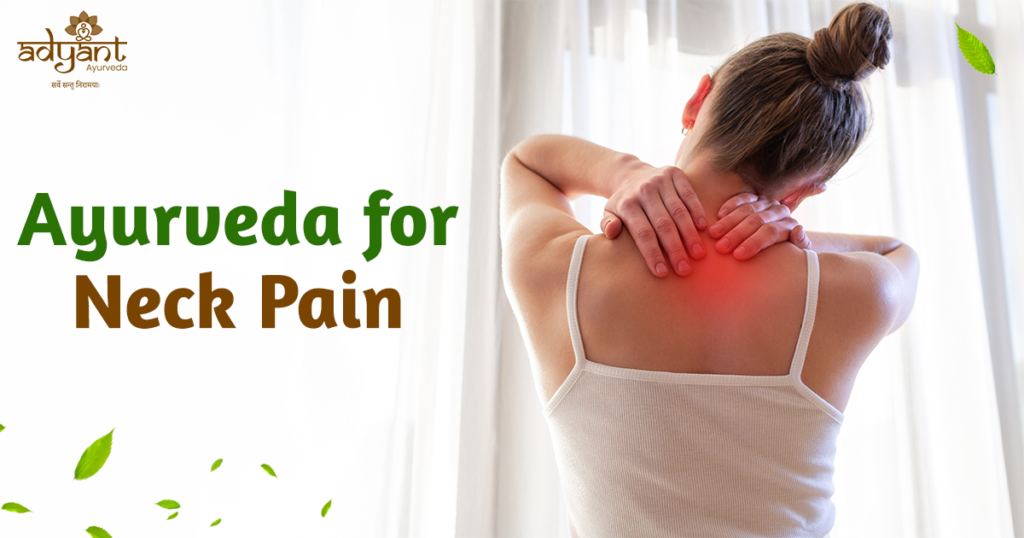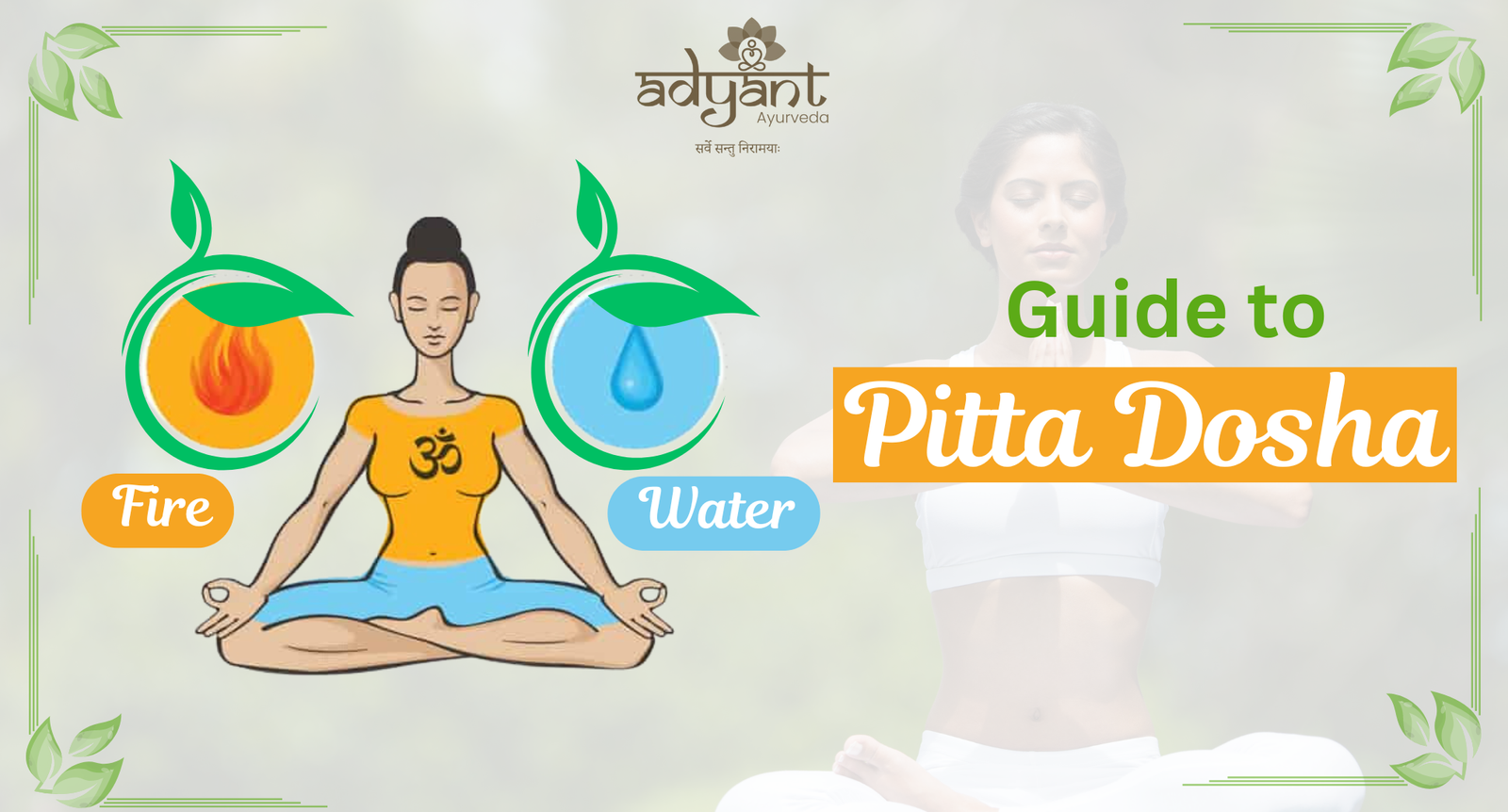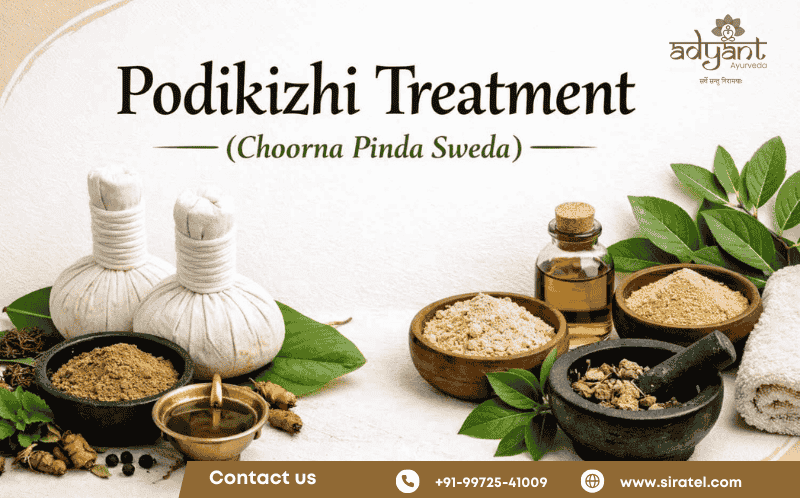Table of Contents
ToggleNeck pain is one of the most common musculoskeletal complaints today, especially among office professionals, IT workers, healthcare staff, students, and people with long screen exposure. It may start as mild stiffness but can gradually become persistent cervical discomfort affecting sleep, productivity, posture, and quality of life.
Conventional management often includes painkillers, muscle relaxants, or short-term physiotherapy. These may give temporary relief, but they usually don’t address the root cause.
Ayurvedic treatment for neck pain focuses on correcting the underlying imbalance (mainly Vata), reducing muscle spasm, improving circulation, nourishing nerves, and preventing recurrence through personalised therapies, medicines, diet, and lifestyle changes.
At Adyant Ayurveda, Bangalore, we offer doctor-supervised, personalised Ayurvedic treatment for neck pain and shoulder pain, including:
- Classical Ayurvedic therapies
- Individualised herbal medicines
- Panchakarma procedures
- Diet correction
- Ergonomic guidance
- Lifestyle modifications
⚠️ Medical Safety Note: Neck pain accompanied by recent trauma, progressive numbness, arm weakness, loss of grip, severe headaches, fever, unexplained weight loss, or bladder/bowel issues requires immediate medical evaluation before starting Ayurvedic treatment.
Types of Neck Pain (With Ayurvedic Correlation)
| Type | Cause | Duration / Features | Ayurvedic Consideration |
|---|---|---|---|
| Acute Neck Pain | Muscle strain, poor posture, and awkward sleeping | Days to weeks | Vata aggravation, Manyastambha |
| Chronic Neck Pain | Cervical spondylosis, disc degeneration, and postural imbalance | >3 months | Greeva Shoola, Vata-Pitta-Kapha imbalance |
| Radiating / Nerve-Related Pain | Disc prolapse, foraminal narrowing, nerve compression | Variable, may worsen with activity | Requires neurological evaluation first |
Causes & Risk Factors of Neck Pain
- Muscle strain or myofascial spasm
- Poor posture and prolonged computer/mobile use
- Cervical spondylosis and disc degeneration
- Spinal canal stenosis or osteoporosis
- Ankylosing spondylitis
- Stress-related muscular tension
In many cases, Ayurvedic treatment for cervical pain begins after proper clinical evaluation and imaging (X-ray/MRI/CT) if required.
Red Flag Symptoms (Do Not Ignore)
Get urgent medical help if you notice:
- Sudden severe neck pain after trauma
- Progressive arm weakness or numbness
- Loss of bladder or bowel control
- Severe headaches, dizziness, or vision issues
- High fever, infection, or unexplained weight loss
Ayurvedic Understanding of Neck & Shoulder Pain
In Ayurveda, neck stiffness and cervical pain are often linked to:
- Manyastambha (neck stiffness) and Greeva Shoola (neck pain) – Vata-dominant disorders
- Amsa Shoola / Amsa Graha – shoulder involvement, often linked to Vata and Kapha obstruction
Contributing Factors: Poor posture, prolonged screen time, mental stress, improper sleep posture, cold exposure, weak digestion (Mandagni)
Ayurvedic Treatment Focus (Root Cause Approach)
The goal of Ayurvedic treatment for neck pain is to:
- Pacifying aggravated Vata Dosha
- Reducing muscle spasm and inflammation
- Improving nerve nourishment and circulation
- Supporting cervical spine and shoulder mobility
Symptoms of Neck Pain (Cervical & Shoulder Involvement)
Common symptoms include:
- Neck stiffness or pain
- Shoulder heaviness or tightness
- Restricted neck or shoulder movement
- Pain radiating to the arms or the shoulder blades
- Tingling, numbness, or weakness in fingers
- Cervicogenic headaches
- Muscle spasms
Progressive weakness, numbness, or loss of coordination requires urgent medical attention.
Clinical Evaluation Before Starting Ayurveda
At Adyant Ayurveda, all patients undergo:
- Symptom history & duration
- Neurological and musculoskeletal exam
- Imaging review (X-ray, MRI, CT)
- Posture, workstation, and activity assessment
- Ayurvedic Dosha, Dushya, and Agni analysis
All therapies follow clinic-level safety guidelines.
When Ayurveda Alone Is NOT Recommended
Ayurvedic management should be supportive (not primary) in:
- Recent high-impact trauma or suspected cervical fracture
- Rapidly progressive arm weakness or sensory loss
- Severe disc extrusion with spinal cord compression
- Cervical infections or tumors
- Loss of bladder or bowel control
Ayurveda can support rehabilitation after medical stabilization.
Ayurvedic Medicines for Neck & Shoulder Pain
| Medicine | Indication | Notes |
|---|---|---|
| Yogaraja Guggulu | Chronic Vata-dominant pain, spondylosis | Take under supervision |
| Rasnaerandadi Kashaya | Muscle spasm, stiffness | Individualised dose |
| Maharasnadi Kashaya | Nerve and joint support | Avoid self-medication |
| Dashamoola formulations | Postural pain, inflammation | Prescribed by a physician |
| Shallaki (Boswellia serrata) extract | Anti-inflammatory, degenerative support | Take with warm water |
| Guggulu Rasayana | Vata disorders, stiffness | Enhances circulation, nerve nourishment |
| Rasnasaptaka Kwatha | Acute muscular pain | Short-term, under supervision |
| Nirgundi Taila | Muscle & Vata-related pain | External or internal with guidance |
| Ashwagandha Churna | Stress-related muscle tension | Supports nerves, take under supervision |
| Rasna Panchaka Kashaya | Muscle & Vata pain, postural support | For chronic neck pain |
| Eranda Taila | Vata disorders, joint mobility | Short-term, supervised usage |
| Laksha Churna | Regenerative support | Chronic degenerative cases |
| Bala Rasayana | Nerve nourishment, stress-related pain | Supports long-term recovery |
🚫 Self-medication is strongly discouraged, especially in cervical spine conditions.
Ayurvedic Oils & Massage Therapy for Neck Pain
| Oil | Indication | Benefit |
|---|---|---|
| Mahanarayana Taila | Chronic stiffness, postural pain | Nourishes nerves, relieves spasm |
| Ksheerabala Taila | Cervical discomfort | Improves circulation |
| Bala Taila | Vata-related muscular pain | Reduces stiffness |
Abhyanga (Therapeutic Massage)
Enhances circulation, reduces stiffness, nourishes nerves, and relieves fatigue. Especially beneficial for posture-related or stress-induced pain.
Learn more about Abhyanga Massage.
External Ayurvedic Therapies for Neck & Shoulder Pain
| Therapy | Description | Benefit |
|---|---|---|
| Greeva Basti | Warm medicated oil retention on the cervical area | Reduces stiffness, nourishes nerves |
| Upanaha Sweda | Herbal poultice for spasm | Relieves muscular tightness |
| Kizhi | Herbal bolus therapy | Improves mobility, reduces stiffness |
Panchakarma for Neck Pain (Chronic / Recurrent Cases)
For long-standing cervical pain, Ayurveda may recommend Panchakarma for neck pain, such as:
- Abhyanga (medicated massage)
- Swedana (therapeutic steam)
- Nasya (highly effective for neck and nerve disorders)
- Basti (best therapy for systemic Vata imbalance)
- Shirodhara (stress-related muscle tension)
These treatments follow classical Ayurvedic references like Charaka Samhita, Sushruta Samhita, and Ashtanga Hridaya, combined with modern clinical evaluation.
Scope & Limitations of Ayurvedic Treatment for Neck Pain
Scope: Reduce pain, improve mobility, prevent recurrence
Limitations: Cannot reverse fractures, severe deformities, or advanced spinal cord compression; supportive alongside conventional care
In such cases, Ayurveda works as supportive care alongside specialist treatment.
Recovery Timeline (Approximate)
| Condition | Expected Improvement |
|---|---|
| Acute muscular pain | 1–3 weeks |
| Chronic postural pain | 4–8 weeks |
| Degenerative cervical disorders | Gradual improvement over months |
Results vary depending on severity, adherence, and lifestyle changes.
Patient Role in Long-Term Success
To get lasting relief from Ayurvedic treatment for neck pain, patients should:
- Follow ergonomic corrections
- Perform prescribed exercises
- Attend follow-ups
- Avoid aggravating activities
- Maintain sleep posture and stress control
Yoga, Pranayama & Prevention
| Practice | Benefit |
|---|---|
| Cat–Cow stretch | Spine flexibility, pain relief |
| Gentle neck rotations | Reduce stiffness |
| Thread-the-Needle pose | Shoulder mobility |
| Nadi Shodhana pranayama | Reduces stress-related muscle tension |
Ergonomic Tips:
- Screen at eye level
- Use a cervical support pillow
- Take movement breaks every 45–60 minutes
- Avoid prolonged static posture
Ayurvedic Diet for Neck Pain (Simple & Effective)
Recommended:
- Warm, freshly cooked meals
- Ginger, turmeric, cumin
- Adequate hydration
- Light, digestible foods
Avoid:
- Cold foods and drinks
- Dry, packaged, processed foods
- Excess raw salads (especially in Vata imbalance)
Home Remedies & Self-Care for Neck Pain (Safe Add-ons)
| Remedy | Method / Benefit |
|---|---|
| Warm compress | 10–15 min on neck/shoulders to relax muscles, improve circulation |
| Turmeric milk | ½ tsp turmeric in warm milk daily, anti-inflammatory |
| Ginger tea | 1–2 cups/day, mild anti-inflammatory and digestive support |
| Epsom salt bath | Relieves muscular tension |
| Gentle neck stretches | Cat–Cow, neck rotations 2–3 times daily |
| Posture breaks | 5-min shoulder rotations/movement every hour |
| Sleep support | Medium-firm pillow supporting cervical curvature |
| Sesame oil warm massage | 5–10 min daily, pacifies Vata, relaxes muscles |
| Cumin & ginger decoction | Anti-inflammatory, digestive support |
| Neck support exercises | Isometric neck exercises (doctor-supervised) |
| Anti-inflammatory diet tips | Turmeric, garlic, ghee; avoid cold/raw foods for sensitive Vata |
✅ Safe adjuncts to therapy; do not replace professional treatment.
Who Can Benefit from Ayurvedic Neck Pain Treatment?
- IT professionals & desk workers
- Cervical spondylosis patients
- Chronic neck & shoulder pain sufferers
- Individuals seeking non-surgical care
Conclusion
Ayurvedic treatment for neck pain at Adyant Ayurveda, Bangalore focuses on root-cause management through dosha balancing, Panchakarma therapies, posture correction, lifestyle modification, and physician-guided medicines. With the right plan and consistency, Ayurveda can provide safe, sustainable, and long-term relief for cervical and shoulder pain.
Written by:
Dr. Sumana Patwardhana, BAMS, MD (Ayurveda) – Senior Ayurvedic Physician & Panchakarma Specialist, 24+ years of clinical experience
Medically Reviewed by:
Dr. Shree Lakshmi, BAMS – Ayurvedic Consultant & Clinical Advisor, 28+ years of clinical experience
Clinic: Adyant Ayurveda, Bangalore
Last Updated: January 2026
Medical Disclaimer: Treatments are personalized, and outcomes vary. This information does not replace emergency or specialist medical care.
FAQs on Ayurvedic Treatment for Neck Pain
Can Ayurveda effectively treat neck pain?
Yes. When guided by a qualified Ayurvedic doctor, treatment can reduce pain, stiffness, and restricted movement. The best results are in chronic, postural, and stress-related neck pain.
Is Ayurveda useful for cervical spondylosis?
Yes. Therapies like Greeva Basti, Panchakarma, medicated oils, and lifestyle correction improve function and mobility. Structural degeneration may not fully reverse.
Which Ayurvedic medicines are commonly used?
Yogaraja Guggulu, Rasnaerandadi Kashaya, Maharasnadi Kashaya, Dashamoola formulations, Shallaki, Guggulu Rasayana, Rasnasaptaka Kwatha, Nirgundi Taila, Ashwagandha Churna, Rasna Panchaka Kashaya, Eranda Taila, Laksha Churna, Bala Rasayana. Never self-medicate.
How long does treatment take?
Acute pain: 1–3 weeks
Chronic/postural pain: 4–8 weeks
Degenerative disorders: gradual improvement over months
Is Greeva Basti effective?
Yes. Localised warm oil therapy reduces cervical stiffness and supports chronic neck pain management.
Can Ayurveda help posture-related neck pain?
Yes. Combines external therapies, oils, corrective exercises, ergonomic advice, and stress management.
Are Panchakarma therapies safe?
Safe when prescribed after evaluation. Avoid in acute trauma, severe disc prolapse with neurological deficits, or infections.
Does Ayurvedic massage help cervical stiffness?
Yes. Medicated oil massage improves circulation, reduces spasm, and nourishes nerves.
Can neck pain resolve naturally?
Mild pain may resolve, but recurrence is common without posture and lifestyle corrections. Chronic pain requires structured medical care.
Can Ayurveda be combined with physiotherapy?
Yes, integrative care with physiotherapy is often recommended for faster recovery under supervision.
Are these therapies safe for elderly patients with osteoporosis?
Yes, when prescribed individually, certain Panchakarma therapies may need modification.
When should I avoid Ayurvedic treatment?
Recent trauma, progressive arm weakness, severe numbness, bladder/bowel symptoms, suspected fractures, or spinal infections—seek immediate medical care









